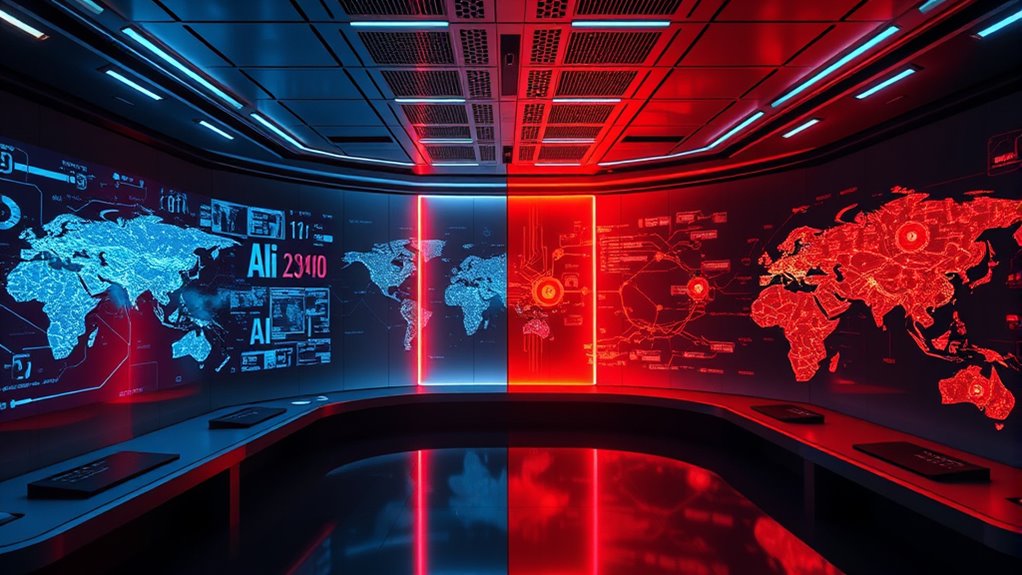The current AI race mirrors the space race of the Cold War era, with nations vying for technological and strategic dominance. Countries invest heavily in advanced algorithms, infrastructure, and innovation to secure economic, security, and geopolitical advantages. This competition influences global power dynamics and sets new standards for influence. If you want to see how this rivalry shapes our future and what it means for world stability, there’s more to uncover ahead.
Key Takeaways
- Both involve intense national competition for technological leadership and strategic advantage.
- The AI race emphasizes algorithms, data, and infrastructure, similar to the technological focus of the space race.
- Ethical concerns and security risks are central in AI, paralleling concerns about space weaponization and safety.
- Control over AI infrastructure mirrors the geopolitical importance of space technology during the Cold War.
- The rivalry shapes global influence and standards, akin to how space exploration influenced superpower dominance.

As artificial intelligence advances at a rapid pace, nations around the world find themselves locked in a silent but intense competition reminiscent of a Cold War. This new rivalry isn’t fought with missiles or rockets but through algorithms, data, and technological dominance. Countries are racing to develop the most advanced AI systems, not just for economic gain but for national security and geopolitical influence. This shift brings the concept of AI ethics into sharp focus. As you push forward with your AI innovations, you must grapple with questions about fairness, transparency, and accountability. Leaders are concerned about the potential misuse of AI, from surveillance to autonomous weapons. Balancing innovation with ethical considerations is no longer optional but essential to maintain legitimacy and public trust.
Nations compete silently in AI race, balancing innovation, ethics, and sovereignty to shape future global power and stability.
Meanwhile, technological sovereignty becomes a critical issue. You’re aware that control over AI infrastructure means control over the future. Countries are endeavoring to reduce dependence on foreign technology, investing heavily in homegrown AI capabilities. Technological sovereignty drives a fierce competition to build independent, resilient AI ecosystems that aren’t vulnerable to external manipulation or espionage. It’s about more than just having cutting-edge tools; it’s about maintaining control over your own digital future. Additionally, ongoing research into AI vulnerabilities highlights the importance of robust safety measures to prevent exploitation. Developing AI safety protocols is increasingly seen as an essential part of responsible innovation, ensuring that AI systems are secure and trustworthy.
In this climate, alliances are formed and broken based on AI capabilities. Governments are prioritizing investments in research and development, understanding that leadership in AI equates to geopolitical power. You see a clear pattern: the race isn’t just about technological supremacy but also about setting global standards. Whoever sets the rules of AI ethics and governance will hold significant sway over international norms. This creates a dilemma—how to foster innovation while ensuring that AI development aligns with shared values. Countries are wary of falling behind yet cautious of unchecked technological advances that could threaten civil liberties or global stability.
The AI Cold War isn’t just about outpacing rivals; it’s about shaping the future landscape of power, influence, and morality. Each nation wants to secure its place at the top without sacrificing ethical principles or compromising its sovereignty. As you witness this unfolding rivalry, it’s clear that this isn’t merely a technological race but a profound test of how societies can navigate the complex intersection of innovation, ethics, and sovereignty. The stakes are high, and the world is watching closely.
Frequently Asked Questions
How Do AI Ethics Differ Between Competing Nations?
You see that AI ethics vary between nations because they prioritize different cultural values and ethical sovereignty. Some countries focus on privacy and human rights, while others emphasize economic growth and security. These differences shape regulations and development, creating distinct approaches. As a result, each nation’s perspective on AI ethics reflects its unique societal norms, making international cooperation complex as they navigate balancing innovation with respecting diverse cultural values.
What Role Does Private Industry Play in the AI Race?
While some see private innovation as a driving force, it’s clear that corporate influence shapes the AI race profoundly. You play a role in this dynamic, as private industry advances AI technology swiftly, often outpacing regulations. This accelerates progress but also raises concerns about transparency and ethics. Your involvement highlights how corporate interests can steer AI development, making it essential for oversight to balance innovation with societal well-being.
How Might AI Warfare Impact Global Security?
You should consider how AI warfare could threaten global security through rapid AI proliferation and cyber espionage. As nations develop advanced AI systems, the risk of malicious use increases, potentially leading to conflicts or destabilization. Cyber espionage becomes more sophisticated, exposing sensitive data and undermining trust. Staying vigilant about these threats helps prevent escalation, ensuring that AI advancements benefit society rather than fueling dangerous rivalries.
Are There International Agreements on AI Development?
You’re right to wonder if there are international agreements on AI development. While some treaties aim to promote responsible AI research, many nations still act independently, making cross-border collaboration tricky. It’s a case of “biting off more than you can chew,” as global efforts are still in their infancy. For AI to benefit everyone, stronger international treaties are vital to guarantee safe, ethical progress worldwide.
What Are the Long-Term Societal Impacts of the AI Cold War?
You might not realize it, but the long-term societal impacts of this AI Cold War shape your life. As nations compete for technological sovereignty, you could see shifts in global power and influence over cultural norms. This race may deepen divides or foster innovation, affecting education, employment, and privacy. Ultimately, your society’s future depends on how these nations balance technological progress with ethical considerations and international cooperation.
Conclusion
As you watch this AI race unfold, remember that history repeats itself, and quick wins often lead to lasting change. Just like the space race, the current AI competition pushes nations to innovate faster and aim higher. Stay aware of the stakes, because in this game, the early bird catches the worm. Ultimately, it’s not just about who leads now, but who shapes the future — so keep your eyes open and minds sharp.







